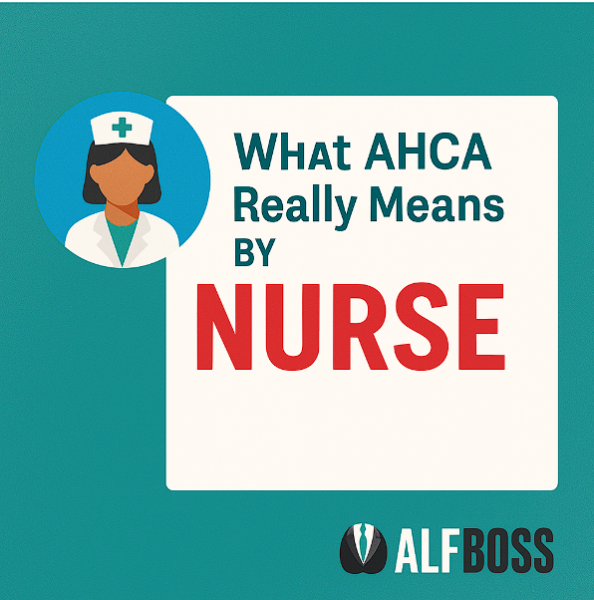
🩺 What AHCA Really Means by “Nurse” — And Why It Matters More Than You Think
If you’re operating an ALF in Florida — especially one with an ECC or LNS license — you’ve probably seen the word “nurse” pop up again and again in the regulations.
And a lot of people make this assumption:
“My med tech or experienced caregiver counts, right?”
The answer is no.
Not according to AHCA.
And misunderstanding that one word could put your license — and your compliance — at risk.
💡 The Definition Most People Skip
Here’s what AHCA actually means when it uses the term “nurse” in the regulations:
“Nurse” means a Licensed Practical Nurse (LPN), Registered Nurse (RN), or Advanced Practice Registered Nurse (APRN) licensed under Chapter 464, Florida Statutes.
That’s it.
- Med tech? Not a nurse.
- CNA? Not a nurse.
- Administrator with 20 years in the game? Still not a nurse — unless they hold that license.
⚠️ Where It Gets Risky: ECC & LNS Licenses
This becomes a real issue with specialty licenses like:
- LNS (Limited Nursing Services)
- ECC (Extended Congregate Care)
These licenses allow you to serve residents with higher medical needs — but they also require that certain nursing services be provided.
And that means you must have an actual licensed nurse (LPN, RN, or APRN) either on staff or contracted.
If you’re counting a med tech or an unlicensed person to fulfill that role, you’re not in compliance — even if they’re trained, experienced, and trusted.
💊 One More Place This Trips People Up: Medication Administration
In all license types — even standard — the rules are clear:
Only a licensed nurse can place medications directly into a resident’s mouth.
That means if you’re assisting with self-administration, great — trained staff can help. But the moment someone is administering medication, it must be a nurse.
That includes:
- Crushing and giving meds
- Putting meds directly into the resident’s mouth
- Injecting medication (like insulin)
- Any administration that goes beyond basic assistance
✅ What You Can Do to Stay in the Clear
- Check that your “nurse” is truly licensed under Chapter 464
- Review your medication policies to make sure they reflect who can assist vs. who can administer
- Train your staff so they’re not accidentally doing something they’re not licensed to do
- If you have ECC or LNS, make sure your documentation reflects that actual nursing services are provided by an LPN, RN, or APRN
Final Thought
We see this mistake more than almost any other — especially with specialty licenses.
“Nurse” isn’t just a job title — it’s a legal designation.
And when AHCA shows up, they’re going to check that your facility understands the difference.
If you’re not sure how your documentation or policies stack up, I can help review them. This is one of those things that’s easy to fix before it becomes a problem.
Great — adding that detail helps clarify that buyers can get paid eventually, but only if they follow the right steps and have the patience (and cash) to wait it out.
Here’s the revised article with that important clarification added naturally: